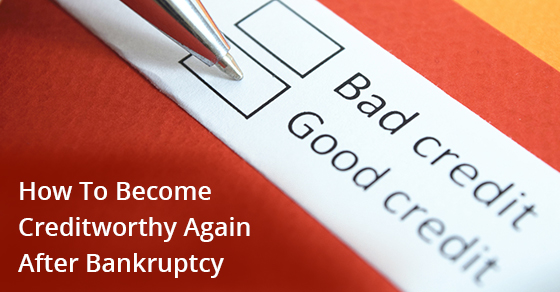If your business or personal finances are in serious trouble, filing for bankruptcy can give you the relief you need and a clean slate to start over. However, many are concerned that bankruptcy will ruin their credit.
Generally, anyone who’s considering bankruptcy already has bad credit due to delayed payments or their debt to income ratio. The assumption that bankruptcy will destroy your financial future forever is a misconception. Indeed, it will affect your credit score, but you can build new credit afterwards and often much quicker then trying to continually pay off debt you cant afford.
Also keep in mind that filing for bankruptcy involves more than simply getting out of debt even though that is the main goal. . You also go through consumer credit counselling, which will improve your financial literacy. Making sound financial decisions is the first step to restoring your credit, and can start this right away.
How long it takes to clear bankruptcy from your credit report
Your information will only be on your credit report for a few years, depending on the credit bureau that is reporting and it is important to understand that this does not mean you cannot obtain credit during this period. For example at Equifax, the largest credit bureau in the country, the record will be maintained on your credit report from the date of the discharge:
-
Six years – if it’s your first bankruptcy, or
-
14 years – if it’s a second bankruptcy
The TransUnion bureau, on the other hand, keeps bankruptcy records seven years from the date of discharge for a first bankruptcy.
At the end of this period, the bankruptcy will no longer be visible on your credit report and can start to rebuild your credit.
Tips for rebuilding your credit after bankruptcy
Bankruptcy gives you a clean slate to get your finances in order. Here are some tips on how you can to start fixing your credit score after bankruptcy:
-
Pay your bills on time (cable, internet, gas, water, etc.). Making your monthly payments is a sign to lenders that you’re responsible with your finances.
-
Obtain your free yearly credit report from Equifax and Transunion by mail and ensure all the information is accurate and has been update properly and notify them of any errors.
-
If you find you need credit, look into getting a secured credit card. First, you need to raise the security amount of about $500 that they will hold in case you default. Use the card to make small purchases and pay the bills promptly each month. This gives you a manageable amount of credit, builds lender confidence, and may also help to clean up your credit history.
If you’re considering declaring bankruptcy it is important to know that it does not affect your credit forever and will often help get you back on track faster then struggling on your own. The first step towards starting fresh is to make an appointment with a Licensed Insolvency Trustee to discuss your situation and your insolvency options. If you’ve already been discharged and are trying to rebuild your credit then just remember that keeping on top of your payments and not overextending can be your most powerful tools.

